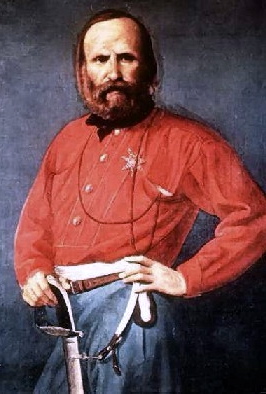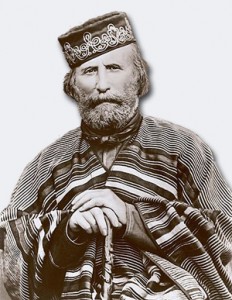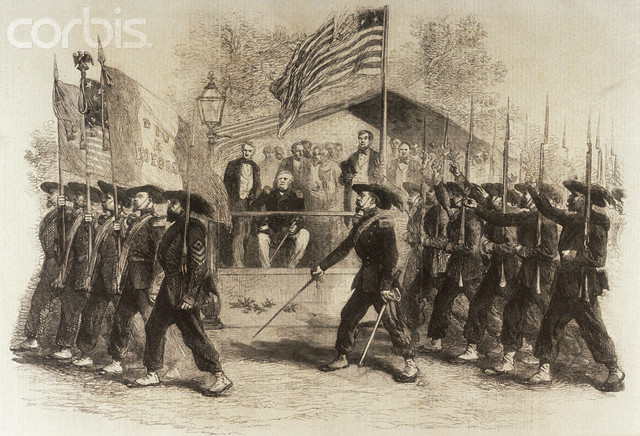Giuseppe Garibaldi resigned his commission of leader of the army of Unification (I Mille) on September 18, 1860 and retired to his home on the island of Caprera off the coast of Sardinia. He was 53 years old and recovering from a battle wound.
In 1861, at the outbreak of the American Civil War, Garibaldi was approached by a representative of the United States Government, reportedly on behalf of President Abraham Lincoln. The Union Army was in disarray and Lincoln was unhappy with those in command. He needed a proven military leader.

As Herbert Mitgang wrote in his fascinating and very detailed article in American Heritage Magazine (October 1975):
“The offer came at a moment in Garibaldi’s life when he lived in semi-exile—too little of a politician to scheme for personal advancement, too much of a national idol to be put behind bars on the Italian mainland. The hero of the movement for a unified Italy, he had led a spectacularly successful revolt against a reactionary regime in Sicily and in Naples—the so-called Two Sicilies—in 1860, but now he was in temporary retirement.
On lonely Caprera, a wild, rocky island covered with juniper and myrtle and stunted olive trees, below La Maddalena off the northeastern corner of Sardinia, Garibaldi tended his vines and figs, built stone walls to fence in his goats, and looked out to the sea, dreaming. The conqueror of the kingdom of the Two Sicilies, in gray trousers and slouch hat, his red shirt and poncho flapping in the wind, refused all titles and honors for himself and sought only lenience for his followers. “How men are treated like oranges—squeezed dry and then cast aside!” he said.
He had wanted to march on Rome, against the “myrmidons of Napoleon in,” supposedly there to protect the pope, and defeat the Bourbon troops. But Victor Emmanuel II, king of Sardinia and now of Sicily and Naples as well, decided that French help was needed to complete unification of Italy and called off Garibaldi’s advance. Going back to Caprera, Garibaldi leaned against the steamer rail and said to his legion of Red Shirts: “Addio—a Roma!”
Abraham Lincoln’s Offer
Through the letter, dated July 17, 1861, from Secretary of State William H. Seward to H.S. Sanford, the U.S. Minister in Brussels, Garibaldi was offered a Major General’s commission in the U.S. Army.

On September 18, 1861, Sanford sent the following reply to Seward:
“He [Garibaldi] said that the only way in which he could render service, as he ardently desired to do, to the cause of the United States, was as Commander-in-chief of its forces, that he would only go as such, and with the additional contingent power – to be governed by events – of declaring the abolition of slavery; that he would be of little use without the first, and without the second it would appear like a civil war in which the world at large could have little interest or sympathy.”
In other words, according to Italian historian Petacco, “Garibaldi was ready to accept Lincoln’s offer but on one condition: that the war’s objective be declared as the abolition of slavery. But at that stage Lincoln was unwilling to make such a statement lest he worsen an agricultural crisis.”
Although President Lincoln did not have Garibaldi leading his troops, he did have Union soldiers trained by Garibaldi. The “Garibaldi Guard” was the nickname given to the 39th New York Volunteer Infantry Regiment that fought in the American Civil War. Many of the regiment’s members were Italian Americans who had served under Garibaldi in Italy.

Garibaldi never joined the Union Army, but he kept track of the American Civil War’s progress. In August 6, 1863, still unhappy with the political outcome of Italy’s Unification, he wrote directly to President Lincoln.
In the midst of your titanic struggle, permit me, as another among the free children of Columbus, to send you a word of greeting and admiration for the great work you have begun. Posterity will call you the great emancipator, a more enviable title than any crown could be, and greater than any merely mundane treasure, You are a true heir of the teaching given us by Christ and by John Brown. If an entire race of human beings, subjugated into slavery by human egoism, has been restored to human dignity, to civilization and human love, this is by your doing and at the price of the most noble lives in America.
It is America, the same country which taught liberty to our forefathers, which now opens another solemn epoch of human progress. And while your tremendous courage astonishes the world, we are sadly reminded how this old Europe, which also can boast a great cause of liberty to fight for, has not found the mind or heart to equal you.
Giuseppe Garibaldi, Scritti politici e militari, ed. Domenico Ciàmpoli, Rome 1907
If Abraham Lincoln had been able to obtain the services of the brilliant Giuseppe Garibaldi, the American Civil War may have ended in short order. As it was, for his military expeditions in South America and Europe (Italy, Austria and France), Garibaldi is known as the “Hero of Two Worlds”.
